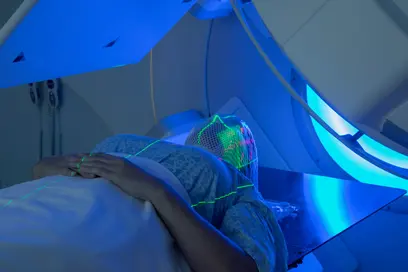Ever since the Cancer Information Service (KID) was established in 1986, breast cancer has been its most frequent topic. It is the subject of one fifth of all inquiries today. This is not surprising considering that the majority of KID users (65 percent) are women. And, since approximately 58,000 women are newly diagnosed with breast cancer each year, it is the most frequent cancer affecting women in Germany. “In the past year, we individually answered far more than 7,000 inquiries about breast cancer by telephone or e-mail," said Dr. Brigitte Kulka, a member of the Cancer Information Service staff.
However, there have been major developments concerning breast cancer in particular. Treatment of breast cancer has become more diverse and more individualized. Twenty-five years ago it was usually treated by radical surgery and complete removal of the breast. In addition, lymph nodes in the armpit were extensively removed. “Back then, major concerns naturally were fears of breast amputation and how to avoid or treat lymph edemas," Brigitte Kulka remembers.
Today, affected women are confronted with a great complexity of available treatment options for breast cancer such as neoadjuvant chemotherapy, i.e., treatment with cytotoxic substances before surgery; targeted drugs such as Herceptin; and various types of antihormonal therapy. Does it have to be a certified breast center or does a conveniently located local hospital offer comparable treatment quality? Is it better to opt for breast reconstruction straight away or can this equally well be done later in a second surgical procedure? Breast cancer patients have to deal with hundreds of questions – and they are much better informed now than they used to be in the early days of the Cancer Information Service. . “We hardly ever have to explain today that breast cancer may recur even after five years," says Brigitte Kukla. “Women now have very precise questions such as about particular treatments they have read about on the Internet."
New medical developments and results obtained in cancer research are regularly reflected in the questions asked at the Cancer Information Service. When the BRCA1 and BRCA2 breast cancer genes were discovered in the mid-1990s, many women who had a breast cancer case in the family turned to KID to ask whether they were themselves in danger of getting the disease. Media coverage prompted many people to grossly overestimate familial cancer risk. When a nationwide mammography screening program was built in Germany in 2005, KID staff answered many questions concerning the availability and accuracy of this examination method and the radiation exposure associated with it.
All in all, however, questions relating to therapies have prevailed in the course of those 25 years. Thus, the breast cancer drug Herceptin is an example of a very frequent topic, says Brigitte Kukla: “Since this drug was launched on the market, there has been a great need for explanation. Why is it not suitable for every patient? Why can it only be prescribed after prior special examination of a tumor sample? We use Herceptin as an example for explaining the principle of personalized medicine."
But the multitude of options demands many decisions from affected women. “Patients are usually well informed by their doctors, but they often feel left alone with all that information. A detailed conversation with KID staff or individually tailored information via e-mail helps them to find a good solution for themselves," says Brigitte Kukla.
About DKFZ
With more than 3,000 employees, the German Cancer Research Center (Deutsches Krebsforschungszentrum, DKFZ) is Germany’s largest biomedical research institute. DKFZ scientists identify cancer risk factors, investigate how cancer progresses and develop new cancer prevention strategies. They are also developing new methods to diagnose tumors more precisely and treat cancer patients more successfully. The DKFZ's Cancer Information Service (KID) provides patients, interested citizens and experts with individual answers to questions relating to cancer.
To transfer promising approaches from cancer research to the clinic and thus improve the prognosis of cancer patients, the DKFZ cooperates with excellent research institutions and university hospitals throughout Germany:
- National Center for Tumor Diseases (NCT, 6 sites)
- German Cancer Consortium (DKTK, 8 sites)
- Hopp Children's Cancer Center (KiTZ) Heidelberg
- Helmholtz Institute for Translational Oncology (HI-TRON Mainz) - A Helmholtz Institute of the DKFZ
- DKFZ-Hector Cancer Institute at the University Medical Center Mannheim
- National Cancer Prevention Center (jointly with German Cancer Aid)
The DKFZ is 90 percent financed by the Federal Ministry of Research, Technology and Space and 10 percent by the state of Baden-Württemberg. The DKFZ is a member of the Helmholtz Association of German Research Centers.



